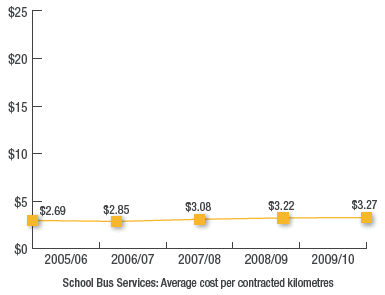School Bus Services
The PTA manages the policy and entitlement framework, system management and contract management of more than 800 orange school bus services around the State. These buses provide access to school for students in rural areas, picking them up from the farm gate (where appropriate), as well as providing access to schools in metropolitan areas for students attending special education facilities. Responsibility for the management of these services rests with the School Bus Services (SBS) branch within Transperth.In 2009/10, the school bus network was made up of 706 school buses servicing mainstream schools, 118 servicing special education facilities, and three regular public transport service arrangements. Around the state, these services were accessed each school day by 26,200 students, using mainly the contracted orange school buses.
Where eligible students could not be accommodated on a school bus, their parents/carers were paid a conveyance allowance to defray the cost of getting their children to the nearest appropriate school. Transport assistance was also provided to students attending special education facilities, mainly in large regional towns and in metropolitan Perth.
Cost of the service
The cost of providing 824 school bus services (inclusive of our seat belt program) and the payment of conveyance allowance was $90.3 million in 2009/10. Including administration and corporate on-costs took the total for 2009/10 to $97.3m.
Objectives and outcomes
|
OBJECTIVE |
OUTCOME |
|---|---|
|
Provide transport assistance for eligible students to attend their nearest government or non-government school offering the appropriate year of study. |
Currently operating 824 orange school bus contracts or paying a conveyance allowance to entitled students at a total cost of $90.3 million (includes seat belt fitment project). |
|
Ensure the transport assistance provided to students is appropriate, cost-effective, safe and fair in its application. |
Continued to manage the introduction of seat belts on government-funded school buses. Conducted two safety inspections on every school bus in the fleet. |
|
Ensure all service contracts are managed effectively and efficiently in accordance with agreements made between the Minister, the PTA and individual contractors and/or their representatives. |
Reviewed special education bus routes in metropolitan Perth and regional towns. Reviewed school bus routes that serve the fringes of metropolitan Perth. |
All orange school buses are operated by private contractors. Four contract/service models were used to provide student transport support:
- Composite Rate Model (CRM) contracts (20-30 years in duration) - 692 contracts
- Fixed-term contracts (1-15 years since 1995) - 131 contracts
- Bunbury Regional School Bus cluster contract - one contract
- Regular passenger transport (licence arrangement with fare subsidy) - three arrangements
The CRM is an average cost model which was implemented in January 2004 and provides for contractor payments, with the cost elements of the payment model being reviewed over a three-year cycle by an independent review panel. The Bunbury cluster contract, previously operating under a licensing arrangement in Bunbury, has a fixed term.
Description of services
In 2009/10, the average cost per contract kilometre rose 1.5 per cent due to:
- An increase in the number of orange school bus contract services from 821 in 2008/09 to 824; and
- additional transport services provided on behalf of the Department of Education.
The service reliability measure covers rural mainstream services and education support school buses operating in the Perth metropolitan area, and is based upon arrival less than 10 minutes before school starts and departure less than 10 minutes after school finishes. In 2009/10, service reliability was 97 per cent (97 cent per cent in 2008-09). SBS also processed 4,719 conveyance allowance claims for eligible recipients - 8.699m conveyance kilometres were travelled, costing $1.73 m in eligible payments.
The year’s developments
On 12 October 2009, the PTA launched its new website as part of its Log on before you Hop on campaign. The website is designed to provide families and other stakeholders with a more streamlined way to conduct their business with SBS. The website, which also contains information on policies and procedures, allows parents to lodge and track applications for transport assistance, lodge claims for conveyance allowance and make changes to their address and contact information.
Other initiatives this year include the creation of an enhanced student database, the computerisation of contract administration, and the computerisation of vehicle inspection records. SBS vehicle inspectors now take laptops into the field and are able to upload/download data as required to complete reports and forward completed reports.
A number of services were reviewed to ensure that we are meeting the needs of eligible students entitled to transport assistance, and various outcomes were achieved:
- Two new services will be introduced to Merredin from the start of term 3, 2010.
- A new service to Moorine Rock from the start of term 3, 2010.
- Two new services to Hyden started in February 2010.
- A new service to Walkaway started in February, 2010.
- A new service to Kukerin started in February, 2010
- Services operating to Boyup Brook, Narrogin, Brookton, Capel, Borden and Kojonup were adjusted to streamline travelling times and make better use of bus-carrying capacities.
At year-end, 499 school buses (59 per cent of the contracted fleet) were fitted with seat belts.
Major initiatives for 2010/11
It is now government policy that from 1 July 2010, all new buses will have air conditioners and an automatic transmission, and contractors will be paid to operate air conditioners (where fitted) all year round.
To maximise efficiency, we will continue to review our operations, including:
- services operating in Perth metropolitan fringe (ie Wanneroo, Bullsbrook, Ellenbrook, Mundaring and Midland) areas;
- rural services in Geraldton, Bindoon, Cunderdin, Buntine, Mukinbudin, Wyalkatchem, Wyndham, Warmun, Balgo, Bidydanga, Ngalapita, Walpole, Denmark, Albany, Margaret River, Manjimup, and Waroona; and
- education support services in Bunbury.
We will also continue to liaise with the Department of Education and Training to review the student transport assistance policy with regard to reviewing transport provision when school facilities are opened or closed.

